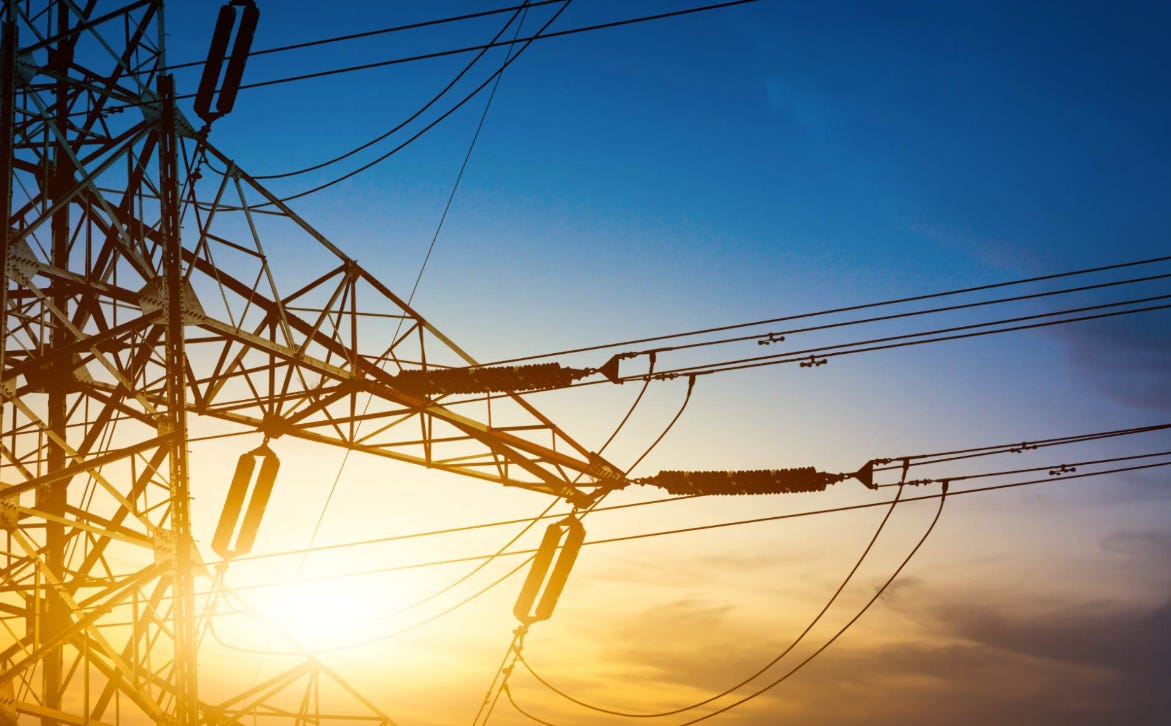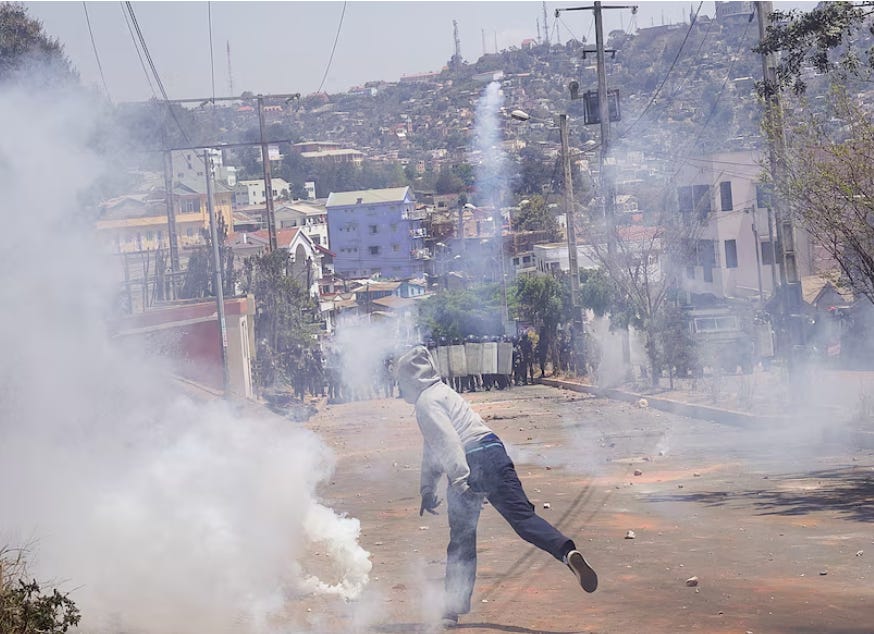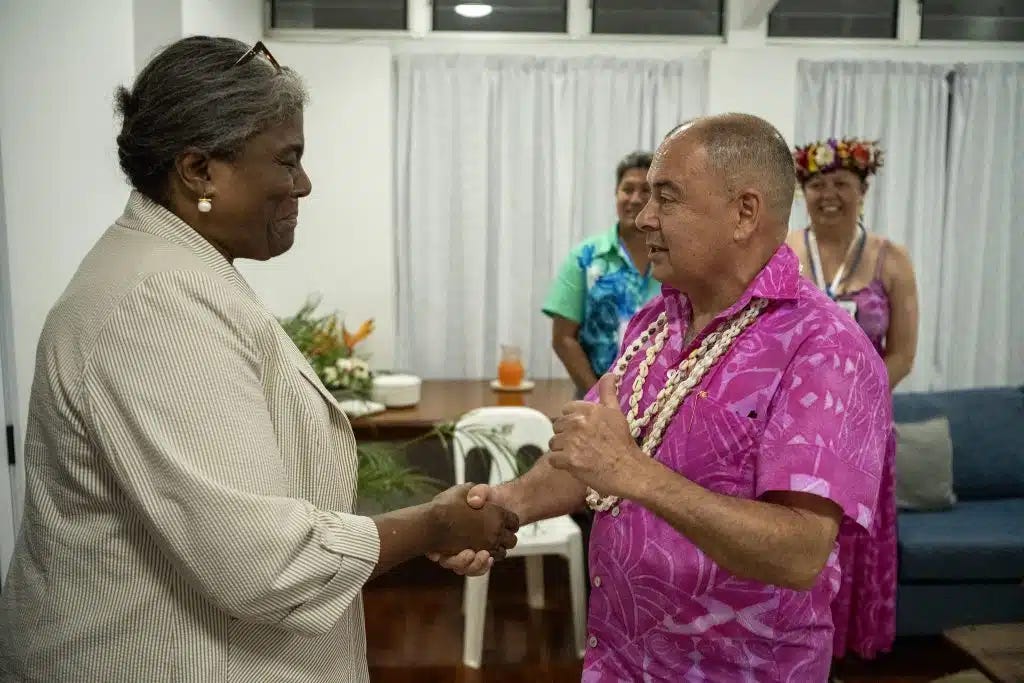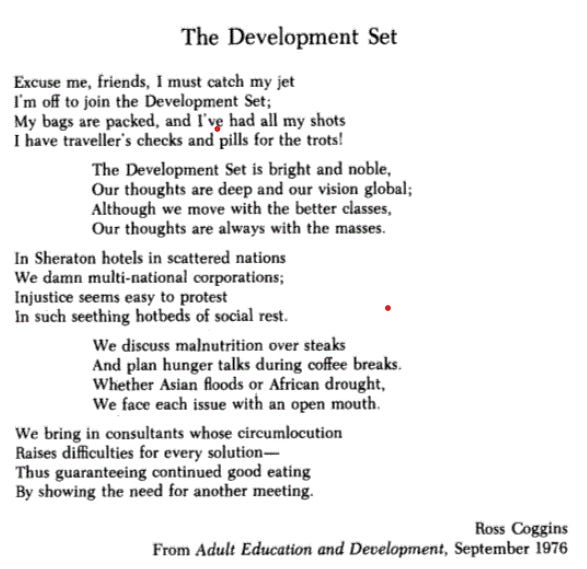Developmental Insights Edition 20
A Short Poem on the International Developmental Sector
I can’t believe that this is the 20th edition of Developmental Insights. When I started this newsletter in January this year, I didn’t think further than the first few weeks of it. Now I’m happy to share that I am growing slowly but surely and the next milestone will be 200 subscribers. I (just!) need 44 more people to subscribe to reach this goal. If you’re interested, please share my newsletter in your networks!
Youth protests and demonstrating for better standards of living have been prevalent in these past few weeks so I’m sharing stories from Morocco and Madagascar. Otherwise, in this edition we look at countries committing to increasing access to electricity, violence in Haiti, and finally, ending with New Zealand pulling aid from the Cook Islands.
Rather than having the usual ‘In Discussion’ that I have at the end of my newsletters, today I will share a poem written in the 1970s about the international development sector.
In this edition:
Rising protest death toll calls for ‘dialogue’ in Morocco
Tens of thousands of people took to the streets across Morocco to protest economic hardship, inequality and political grievances. The protests have drawn attention to the frustrations of younger Moroccans especially, who have stated that they feel excluded from meaningful societal participation. Across the country, the protests turned violent as police intervened with force. At least two people were killed in clashes between the protestors and security forces while even more were wounded.
Protest leaders have called for the government’s resignation in response to what they see as unacceptable repression and longstanding unmet demands. In the aftermath of the protests, Prime Minister Aziz Akhanouch reportedly called for dialogue to defuse tensions. Overall, the situation in the country remains volatile, and observers see these protests as a test for how far the government is willing and able to address structural grievances without further violence.
17 countries commit to concrete plans to scale up access to electricity
17 African countries have formally endorsed ‘Energy Compacts’ - actionable country-specific plans - to expand access to electricity as part of Mission 300, a partnership between the World Bank Group and the African Development Bank, with the aim of connecting 300 million Africans to electricity by 2030. The countries that committed include Benin, Botswana, Burundi, Cameroon, Comoros, Republic of the Congo, Ethiopia, The Gambia, Ghana, Guinea, Kenya, Lesotho, Mozambique, Namibia, São Tomé and Príncipe, Sierra Leone, and Togo.
Mission 300 relies on these ‘Energy Compacts’ to guide reforms across three pillars: improving infrastructure, mobilising finance and enacting enabling policies. Since the Mission was launched, 30 million people have already been connected to electricity with over 100 million more in line. Access to electricity is key to many things, some of which are job creation, industrial growth, economic inclusion and clean cooking.
Increasing violence and funding cuts impact millions across Haiti
Haiti faces one of the world’s most severe food crises, which is only deepening due to steep funding cuts to the World Food Programme (WFP). The WFP have reported that armed groups control nearly 90% of Port-au-Prince, the country’s capital, leading to higher food prices for a population already facing severe food insecurity and obstructing farmers’ access to markets.
Since 2022, 1.3 million people (more than half of which are children) have been forced to flee their homes in search of food and shelter, while over 16,000 people have been killed and 7,000 injured. The violence is spreading throughout the country with more fertile ground for arms, drugs and human trafficking. An increasing amount of children are being subjected into trafficking, exploitation and forced recruitment by the gangs.
Deadly protests in Madagascar leads to government dissolution
In Madagascar, repeated shortages of water and electricity have led to youth led protests. Protestors gathered in the capital, Antananarivo, and other locations, condemning the government’s failure to ensure basic services including frequent power cuts and water supply disruptions. The protests spanned three days and quickly escalated, becoming some of the most serious unrests seen on the island in years. At least 22 people were killed and over 100 injured in clashes involving security forces, bystanders and looting.
In response to the outcry, President Andry Rajoelina announced that he was dissolving the government and called for dialogue with young people. Issuing apologies for the failures related to water and power supply, he pledged to take measures to support businesses that had been hurt by the unrest. Authorities had imposed a dusk-to-dawn curfew and in suppressing some protests, the police used tea gas and force against the crowds.
New Zealand pulls aid from the Cook Islands
New Zealand has suspended its aid - roughly US$ 11 million per year - to the Cook Islands, citing deteriorating diplomatic relations. This has partly been triggered by the Cook Islands’ Prime Minister Mark Brown who entered into a ‘comprehensive strategic partnership’ with China without consulting New Zealand. The withdrawal of aid raises concerns among Cook Islands about the future of their economic stability and preserving their right to mobility to New Zealand.
Chinese investments are viewed as both an opportunity and a reason for worry - there will be an opportunity for more funding and infrastructure. However, there is worry over environmental risks and about losing leverage for long time partners like New Zealand.
The Development Set by Ross Coggins (1976)
The below short poem was published by Ross Coggins, a Baptist missionary and USAID worker. He wrote about the state of the sector then and some of it is relevant now:
This was the first time I had come across the poem so thought it would be interesting to share. Please share your views and opinions on it in the comment section!
As always, thanks for reading edition 20 of Developmental Insights - I hope you enjoyed it and found it informative! Please subscribe to the newsletter if you would like to continue receiving it straight to your inbox every other Friday!
I am always open to suggestions or feedback so please send anything to developmentalinsights@gmail.com or, simply add a comment below!
I look forward to connecting with you further in future editions!
Best,
Harkiran







